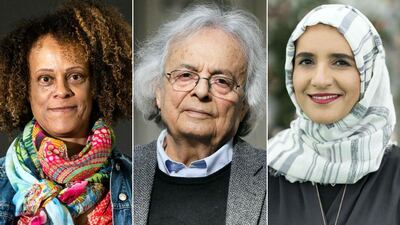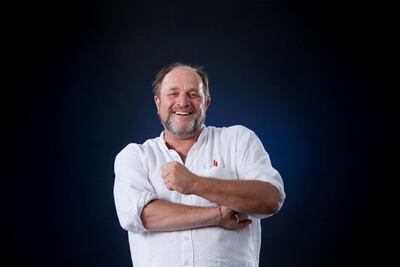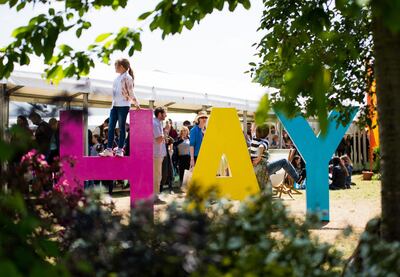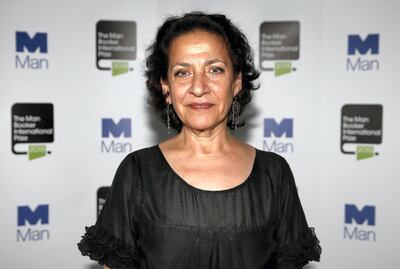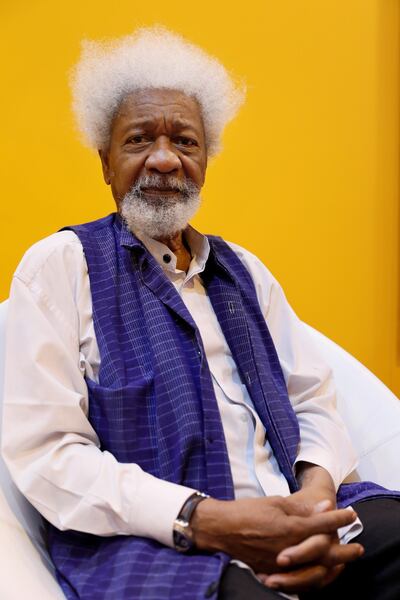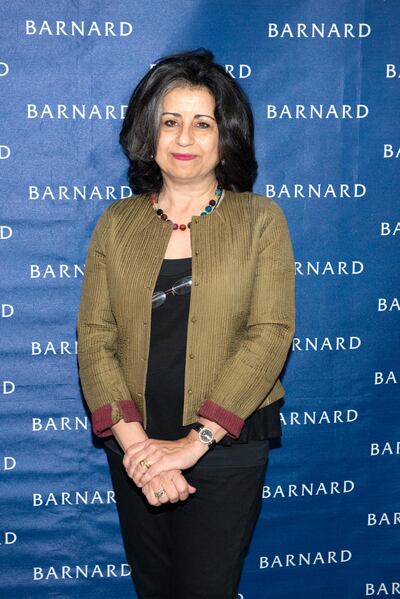"Yes, it's very full," laughs Peter Florence, as I recount to him some of the 60-plus names on Hay Festival's programme for its debut Abu Dhabi event. "But one of the things we wanted to do most clearly was make a really strong statement about what festival we think it can be," says the director of the literary event, "and pack it with entertainment that people will be able to engage with in lots of different ways."
And pack the itinerary organisers have indeed, with the full line-up, announced today, boasting a rich, diverse mix of prestigious poets, novelists, scientists, musicians and historians from Nigeria, the Philippines, Bangladesh and beyond.
While major names including Adonis, the pioneering Syrian poet, and Omani Man Booker International Prize winner Jokha Alharthi had already been teased ahead of the four-day festival’s launch, the finalised schedule reads like a who’s who of Arab literature.
Joining the Al-Kitab writer and the Celestial Bodies author on the bill is Egypt's Ahdaf Soueif, who penned 1999's Man Booker-shortlisted The Map of Love, this year's International prize for Arabic fiction winner, Lebanese novelist Hoda Barakat, and Iraqi author Ahmed Saadawi, who won the same award in 2014 for Frankenstein in Baghdad.
Nigeria's 1986 Nobel Prize for Literature winner Wole Soyinka, Ilustrado author Miguel Syjuco, and Tunisia's Nobel Peace Prize laureate Ahmed Galai are among the eminent names set to take to the stage.
“The Hay Festival Abu Dhabi will be an important celebration of tolerance and cultural exchange,” said Sheikh Nahayan Mabarak Al Nahyan, Minister of Tolerance, as the programme was announced. “I invite all to attend the festival with an open will, open heart and open mind. I encourage all of us to seize this opportunity to witness, share and engage in the meaningful ideas and conversations that will stay with us. Most of all, I encourage all of us to have fun and to relish the festival’s expressive and vibrant atmosphere.”
Also due to appear in the capital during Hay Festival Abu Dhabi, which will take place from Tuesday, February 25 to Friday, February 28, are British Girl, Woman, Other author Bernardine Evaristo, who was awarded the 2019 Booker Prize, Fatima Bhutto, writer and niece of former Pakistan prime minister Benazir Bhutto, and Scottish historian William Dalrymple, who will talk about the corporate history of the British in India.
Joining such scribes will also be Palestinian doctor Izzeldin Abulaish, who will address the link between health and peace, Bettany Hughes who will discuss the rebuilding of Syrian heritage, and garden designer Kamelia Zaal, who will share her knowledge of regional plant life.
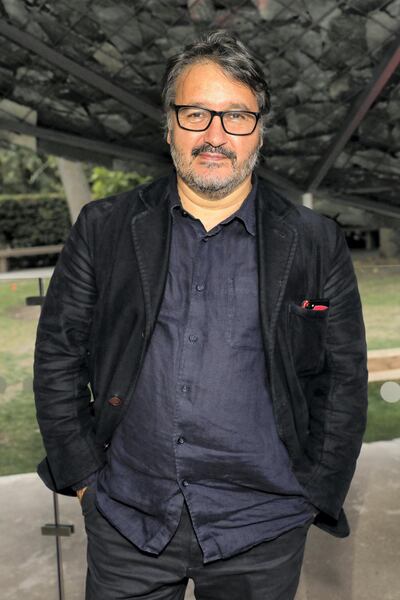
It’s a considered, eclectic, erudite mix that takes in figures from across the globe, but when it came to sourcing ideas for the programme, Florence and his team looked to the people of Abu Dhabi for inspiration.
“Talking to Emiratis, talking to internationals who live in Abu Dhabi, asking them ‘who would you most like to meet, whose stories and opinions would you most like to hear’ – that’s been an incredibly rewarding and rich source of programming,” says Florence, who cofounded Hay’s flagship Welsh festival with his parents in 1987. “Pulling those strands together and saying ‘well, if you like that, then maybe you should try this’ has been a really exciting adventure.”
An homage to poetry
The heart of the inaugural festival, supported by the UAE’s Ministry of Tolerance, will be Manarat Al Saadiyat with events hosted around the capital. Leads have been taken from its Welsh namesake, which holds music performances alongside its literary interviews and panels.
Beirut rockers Mashrou' Leila will return to the UAE for a concert, while Lebanese composer Marcel Khalife will set Mahmoud Darwish's words to music in an evocative show. It was a conscious decision to include sound as well as the written word, Florence reveals.
“It’s really important to us that while the foundations of the festival are in language and dialogue and conversation, part of those conversations happen with music and performance,” he says. “I don’t want anybody to think this isn’t a party – it’s a celebration as much as it is anything. I don’t want it to be a dry event; it requires people to join in and participate.”
Such audience participation can come in a number of languages, with Hay Festival Abu Dhabi set to host events in a game-changing range of seven mother tongues, from English and Arabic to Hindi and Tagalog, a welcome nod towards the broad range of communities that make up the UAE.
"All of the festival will be translated in and out of Arabic at the Manarat," Florence details. "We're also quite happy with not translating some events. If there's an event in Hindi and it needs to be in Hindi, it's in Hindi. The glory of the UAE is that there are so many rich and huge language groups that you can try to give everybody a taste of their own language, as well as events in Arabic and English."
Describing the lingual breadth of the event as presenting "amazing opportunities", rather than challenges, Florence believes the linguistic scope of the Abu Dhabi festival is unprecedented for Hay.
The centrepiece of the event, in organisers' eyes, is the appearance of Adonis, who will celebrate his 90th birthday, which fell on January 1, in the capital. The star wordsmith, widely credited with sparking a modernist revolution of poetry in the region, will host seminars at Sorbonne University Abu Dhabi about contemporary poetry, and will also be feted in a gala at Manarat Al Saadiyat.
The gala "will feature his own poetry and his friends' responses to his poetry", divulges Florence. "It will be a celebration of how much he has meant to not just Arab literature, but to world literature. It's a wonderful opportunity to put the marker down, to say alongside some younger novelists you've also got a world great among us."
The poet has himself been instrumental in curating the festival's programme, encouraging his friends and colleagues, such as Volker Braun, Zuleikha Aburisha and Yang Lian, to join the line-up.
"That's a particular strength of this festival, I think," says Florence, ruminating on the presence of poetry among the programme's genres. "I think one of the extraordinary riches of Arabic literature is that poetry is set at least next to, if not higher, than prose. That's a great gift for us, because I think a lot of our international festivals are prose-heavy."
'It's our least homogeneous festival'
Further enriching the itinerary will be regional film screenings, held in partnership with BBC News Arabic, with a segment dedicated to female directors, spoken-word performances and a free-to-enter festival site featuring a bookshop, much like its Welsh original.
Bolstering the event is a children's programme, with appearances from the likes of teenage Emirati author Dana Alblooshi, as well as a nightly writers' table exploring topics that have arisen throughout the day.
“I hope it retains the informal gathering of people,” says Florence, on his hopes for the Abu Dhabi version, which follows in the footsteps of similar outposts in Colombia, Peru and Spain. “And what I suspect that it will do, that is unique to itself, is mix cultures and languages and ideas, and allow people space to create their own mixtape of the conversations that happen.
"I think this festival, of all our festivals, is the least homogeneous, the most varied, and I love the idea that the UAE's greatest strength, which is its plurality, is also something that can feed into this festival."
But with a programme so varied, so comprehensive, so brimming with possibilities, how does one decide what to see? On Florence’s own agenda is a discussion with French physicist Christophe Galfard, who “has a take on the cosmos and our place in it that’s rather remarkable”, as well as Alharthi, whom he touts as a writer set to be “one of the greats of world literature”.
“She’s young, she’s dynamic, she’s doing, as I understand it, things with the Arabic language that are remarkable, and she tells an amazing story,” he adds of the Omani writer.
While Florence teases that Hay Festival Abu Dhabi, in its fluidity, might have some last-minute additions – “the surprises are always the great joys of festivals” – one thing that is set in stone is its goal to be more than a one-hit wonder.
“We absolutely want to make this festival work and to build on it, so that in 10 or 15 years’ time, people will perhaps look upon it in the way that the Colombians do with our festival in Cartagena,” he says.
“I think there’s the basis for conversations that can be had forever. There’s no limit for this.”
For the full programme and to purchase tickets, visit www.hayfestival.com/abu-dhabi. Those in full-time education or under 25 years of age can book tickets to events free of charge
Top names not to miss at Hay Festival Abu Dhabi
Jokha Alharthi
The Omani author became the first Arabic-language winner of the International Man Booker Prize in May 2018 for her novel Celestial Bodies, a tale that orbits around the lives and loves of three sisters.
Bernardine Evaristo
The British writer co-won the 2019 Booker Prize, along with The Handmaid's Tale author Margaret Atwood, for her novel Girl, Woman, Other. The seminal work focuses on 12 predominately black British women, exploring issues of identity, feminism and relationships.
Hoda Barakat
The Lebanese novelist claimed the 2019 International Prize for Arabic Fiction, the first woman to do so, for The Night Mail, a work crafted from a series of fictional letters written by people in exile.
William Dalrymple
The Scottish historian and writer, known for books such as In Xanadu and The Last Mughal, will be at Hay Festival Abu Dhabi to discuss his latest work, The Anarchy, an examination of the East India Company's rise and influence.
Hanan Sayed Worrell
The author and foodie, who was raised in Kuwait and lives in Abu Dhabi, might have a background in urban and cultural projects, but it's her cookbook Table Tales, which brings together recipes from the UAE's global communities, that forms the basis of her appearance at Hay.
Ahmed Saadawi
The Iraqi Frankenstein in Baghdad novelist, who also writes as a poet and screenwriter, was part of Beirut39, Hay Festival's list of most exciting authors of Arab heritage under the age of 40, compiled as part of a 2010 event held in the Lebanese capital.
Ahdaf Soueif
The Egyptian novelist, whose 1999 book The Map of Love was shortlisted for the Man Booker Prize, is also known for her work as a cultural commentator and as the founder of the Palestine Festival of Literature.
Fatima Bhutto
The Pakistani author is the granddaughter of the late Pakistani prime minister Zulfiqar Ali Bhutto. She published her first book at the age of 15, and is known for her 2010 memoir, Songs of Blood and Sword.
Marcel Khalife
The Lebanese composer and singer, who is a master of the oud, is a Unesco Artist for Peace, famed for tracks such as Jawaz al-Safar. In the 1970s, he founded the Al Mayadine ensemble to preserve Arab musical heritage.
Wole Soyinka
The Nigerian author and activist became the first black African Nobel Prize in Literature winner in 1986, and is known for works such as A Dance of the Forests, The Strong Breed and Poems from Prison, the latter written when he was jailed in the 1960s for opposing Nigeria's civil war.
